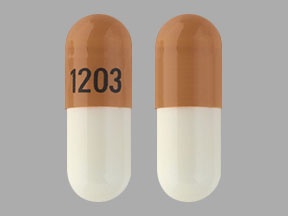Trientine Dosage
Medically reviewed by Drugs.com. Last updated on May 14, 2024.
Applies to the following strengths: 250 mg; 500 mg; 300 mg
Usual Adult Dose for:
Usual Pediatric Dose for:
Additional dosage information:
Usual Adult Dose for Wilson's Disease
750 to 1250 mg, orally, in divided doses given 2, 3, or 4 times daily
Maximum dose: 2000 mg daily
Comments:
- Increase dose for inadequate clinical response or free serum copper persistently above 20 mcg/dL.
- Re-evaluate dose every 6 to 12 months.
- Clinical experience with this drug is limited and alternate dosing regimens have not been well characterized.
- All dosing endpoints are not well defined.
- This drug is not interchangeable with penicillamine.
- Use this drug when penicillamine treatment is not possible because of intolerable or life threatening side effects.
- This drug is not recommended for cystinuria or rheumatoid arthritis.
- It is incapable of binding cystine, so it is of no use in cystinuria.
- In a small study, it was ineffective for rheumatoid arthritis.
- This drug is not indicated for treatment of biliary cirrhosis.
Use: Treatment of Wilson's disease in patients who are intolerant of penicillamine.
Usual Pediatric Dose for Wilson's Disease
13 and older:
750 to 1250 mg, orally, in divided doses given 2, 3, or 4 times daily
Maximum dose: 2000 mg daily
12 and under:
500 to 750 mg, orally, in divided doses given 2, 3, or 4 times daily
Maximum dose: 1500 mg daily
Comments:
- Increase dose for inadequate clinical response or free serum copper persistently above 20 mcg/dL.
- Re-evaluate dose every 6 to 12 months.
- Clinical experience with this drug is limited and alternate dosing regimens have not been well characterized.
- All dosing endpoints are not well defined.
- This drug is not interchangeable with penicillamine.
- Use this drug when penicillamine treatment is not possible because of intolerable or life threatening side effects.
- This drug is not recommended for cystinuria or rheumatoid arthritis.
- It is incapable of binding cystine, so it is of no use in cystinuria.
- In a small study, it was ineffective for rheumatoid arthritis.
- This drug is not indicated for treatment of biliary cirrhosis.
Use: Treatment of Wilson's disease in patients who are intolerant of penicillamine.
Renal Dose Adjustments
Data not available
Liver Dose Adjustments
Data not available
Dialysis
Data not available
Other Comments
Administration advice:
- Take on an empty stomach, at least one hour before or two hours after meals.
- Take at least one hour apart from any other drug, food, or milk.
- Swallow capsules whole; do not open or chew capsules.
Storage requirements:
- Refrigerate.
- Keep container tightly closed.
Patient advice:
- There is a potential for contact dermatitis; if exposure to capsule contents occurs, wash exposed area with water promptly.
- For the first month of treatment, have the patient take their temperature nightly, and report any fever, skin eruption, or other symptoms.
More about trientine
- Check interactions
- Compare alternatives
- Pricing & coupons
- Reviews (1)
- Drug images
- Side effects
- During pregnancy
- Drug class: chelating agents
- Breastfeeding
- En español
Patient resources
Other brands
Professional resources
Other brands
Related treatment guides
See also:
Further information
Always consult your healthcare provider to ensure the information displayed on this page applies to your personal circumstances.


